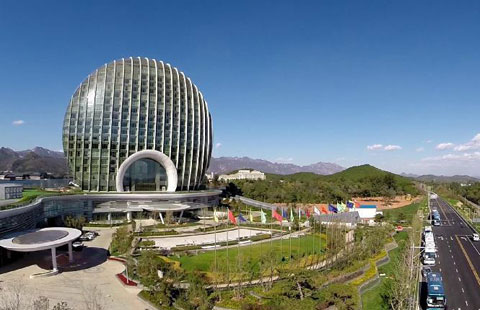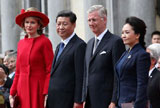APEC's impetus lies in reshaping
Updated: 2014-11-07 16:34
(Xinhua)
|
||||||||||
A new mechanism is in need to sharpen the region's competitive edge by lifting its profit-making ability in global industry chain.
A traditional trade theory says a country that sells more gains more benefit, but now it's time to think twice.
Think when you hold an iPhone. The iOS system is developed in America but the screen and cells manufactured in South Korea, and chips probably in Japan. It is Chinese workers that assemble them with home-grown phone shells, data links and protective films.
Over 80 percent of Chinese mobile phones are exported and all those belongs to China's export share. It is estimated that China earns only several dollars for an iPhone that sells 200 to 300 dollars at factory price.
However, most trade policies are applied only on the borders, either by tariff or non-tariff measures. China's initiative on global value chains (GVCs) is expected to provide APEC members the capacity to monitor each links of the value chain to enlarge and improve them.
China has taken actions along the complicated GVCs. Now, a South Korean mobile phone manufacturer in China would meet no quota limitations if it imports parts from its own country.
The APEC platform is not a closed club with one-for-all criteria. Under its framework, less developed economies need encouragement and incentives to catch up.
China's large economic size and robust growth can serve as a source of confidence for APEC members. Its reform pledge and on-going economic restructuring will change its position in the value chain, while the resulting vigor and efficiency will help drive other APEC economies that are closely linked with China in the chain.
In fact, only when the development gap among APEC members narrows, the APEC goal for deeper trade facilitation becomes practicable.
China is willing to build more infrastructures in order to lay a physical foundation for regional prosperity. The infrastructure investment is a priority in the "one belt and one road" plan China launched in 2013 to promote cooperation among Asian economies.
Plus, China's latest effort to improve the regional infrastructure and connectivity is the advocation of building the Asian Infrastructure Investment Bank (AIIB). The bank is widely welcomed by economies in the APEC areas.
It is reasonable to believe the Beijing meetings a landmark in APEC history that will reshape the group's framework and bring sustained prosperity for the region.









